Millennium Point Trust is more than just a name; it actively has an impact on Birmingham and the West Midlands. As a charity committed to promoting science, technology, engineering, and mathematics (STEM), the Trust channels revenue generated by Millennium Point into local initiatives, projects, and partnerships. Here’s how Millennium Point Trust makes an impact:
1. Funding STEM education for the future
At the heart of our Trust’s mission is a commitment to supporting STEM education. Each year, the Trust awards grants to schools, colleges, and organisations to fund innovative STEM projects. From robotics kits to science workshops, these grants provide young people with hands-on experiences that ignite a passion for learning and inspire future careers.
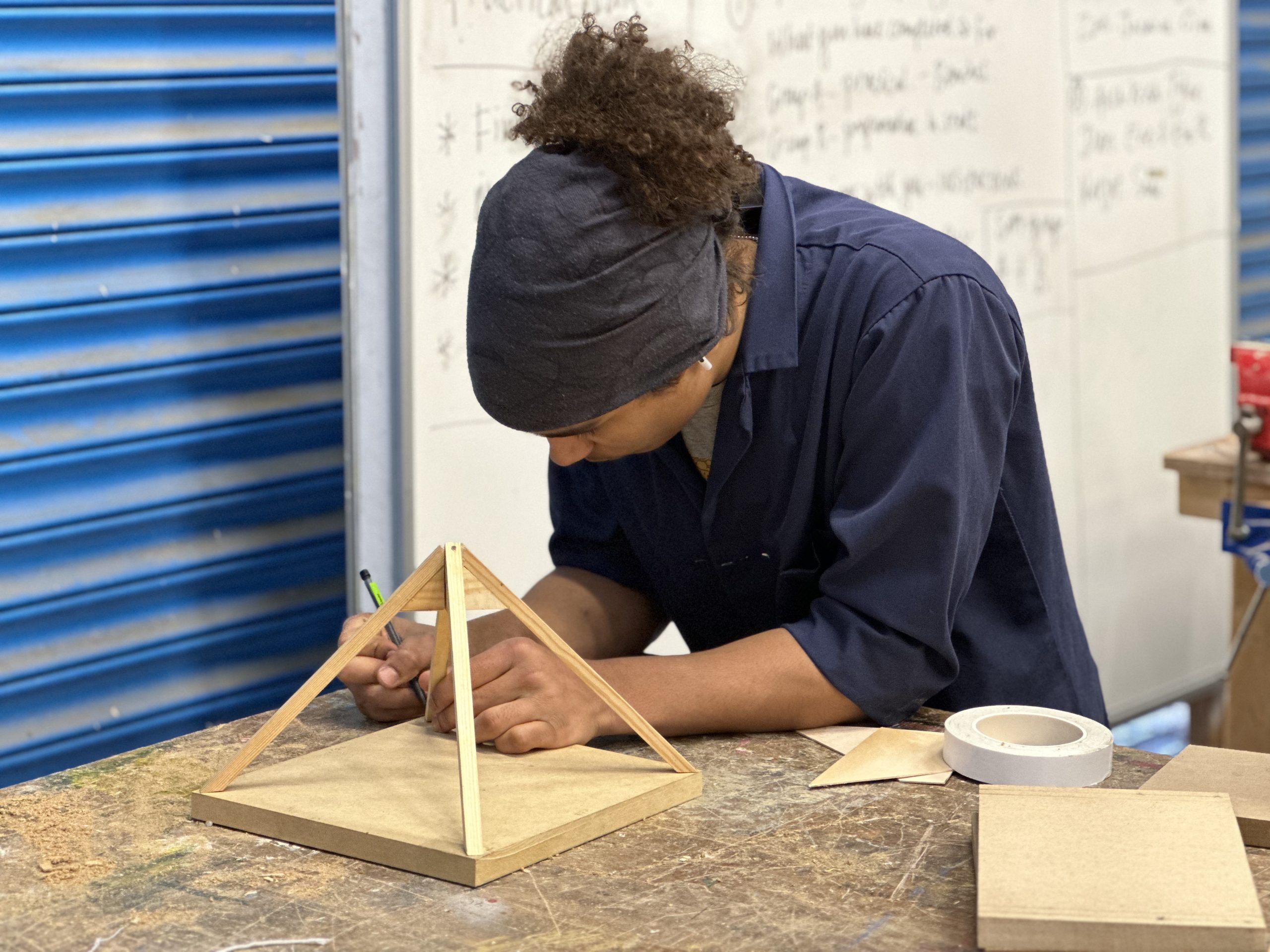
2. Empowering underrepresented groups
The Trust works to ensure STEM is accessible to everyone, regardless of background. By funding initiatives that target underrepresented groups, the Trust helps to break down barriers and create opportunities for all. This focus on inclusivity boosts the STEM landscape and ensures no talent is left ignored.
3. Supporting local organisations
Collaboration is vital for creating meaningful change, and Millennium Point Trust is proud to work with local charities, schools, and community groups. These partnerships enable the delivery of projects that make an impact, from after-school STEM clubs to community events that engage families in science and technology.
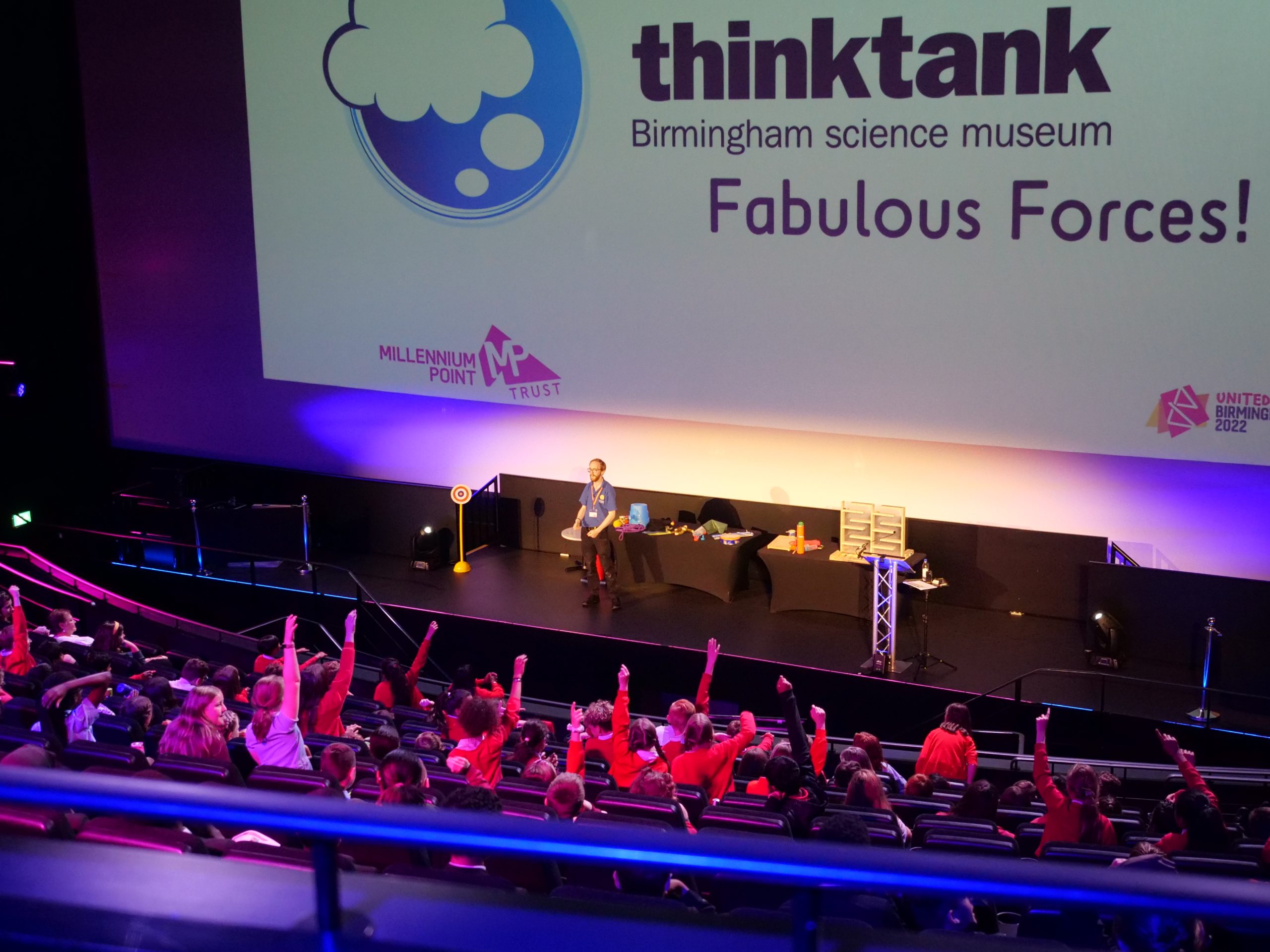
4. Encouraging innovation in education
Education doesn’t have to happen in a classroom. The Trust funds creative projects that make STEM subjects exciting and relevant. Whether it’s building solar-powered models or exploring the principles of coding through gaming, these initiatives help students connect STEM to real-world applications.
5. A venue with a purpose
When you book an event at Millennium Point, you’re contributing directly to the Trust’s work. Revenue generated by venue hire is reinvested into the community, funding projects that make a real difference. By choosing Millennium Point, businesses and individuals play a part in creating a brighter future for Birmingham.
6. Inspiring the next generation
Through its work, the Trust inspires young people to see the potential of STEM. By providing access to resources, experiences, and mentorship, the Trust helps young minds imagine themselves as the engineers, scientists, and innovators of tomorrow.
7. Driving regional growth
Investing in STEM isn’t just about education; it’s about supporting the economic and social development of the West Midlands. By giving young people the skills needed for high-demand jobs, the Trust plays a role in shaping the region’s workforce and driving its growth as a hub for innovation.
Millennium Point Trust has already made a significant difference, awarding over £40 million in funding since its inception. Its projects have reached thousands of young people, sparking curiosity and ambition across Birmingham and beyond. The Trust’s ongoing commitment ensures that this impact will continue to grow in the years to come.
Millennium Point is delighted to support the Engineering Inclusive Futures scheme spearheaded by Birmingham Open Media (BOM). This initiative brings an extraordinary opportunity for 20 Special Educational Needs (SEN) learners to immerse themselves in engineering, gaming, and virtual reality, showcasing the power of inclusivity in technology. The Millennium Point Charitable Trust’s funding enables a series of workshops designed to bring technology closer to the students.
The project kicked off with a workshop at Aston University, where SEN students from Birmingham’s Wilson Stuart School explored the Rock Mobility Climber wheelchair, presented by Rock Engineering. This not only allowed the children to voice their thoughts on the design but also served as a bridge between them and the world of product development. Timothy Whitehead, a Product Design lecturer at the university, delivered a thought-provoking seminar which was then followed by an exciting virtual reality workshop.
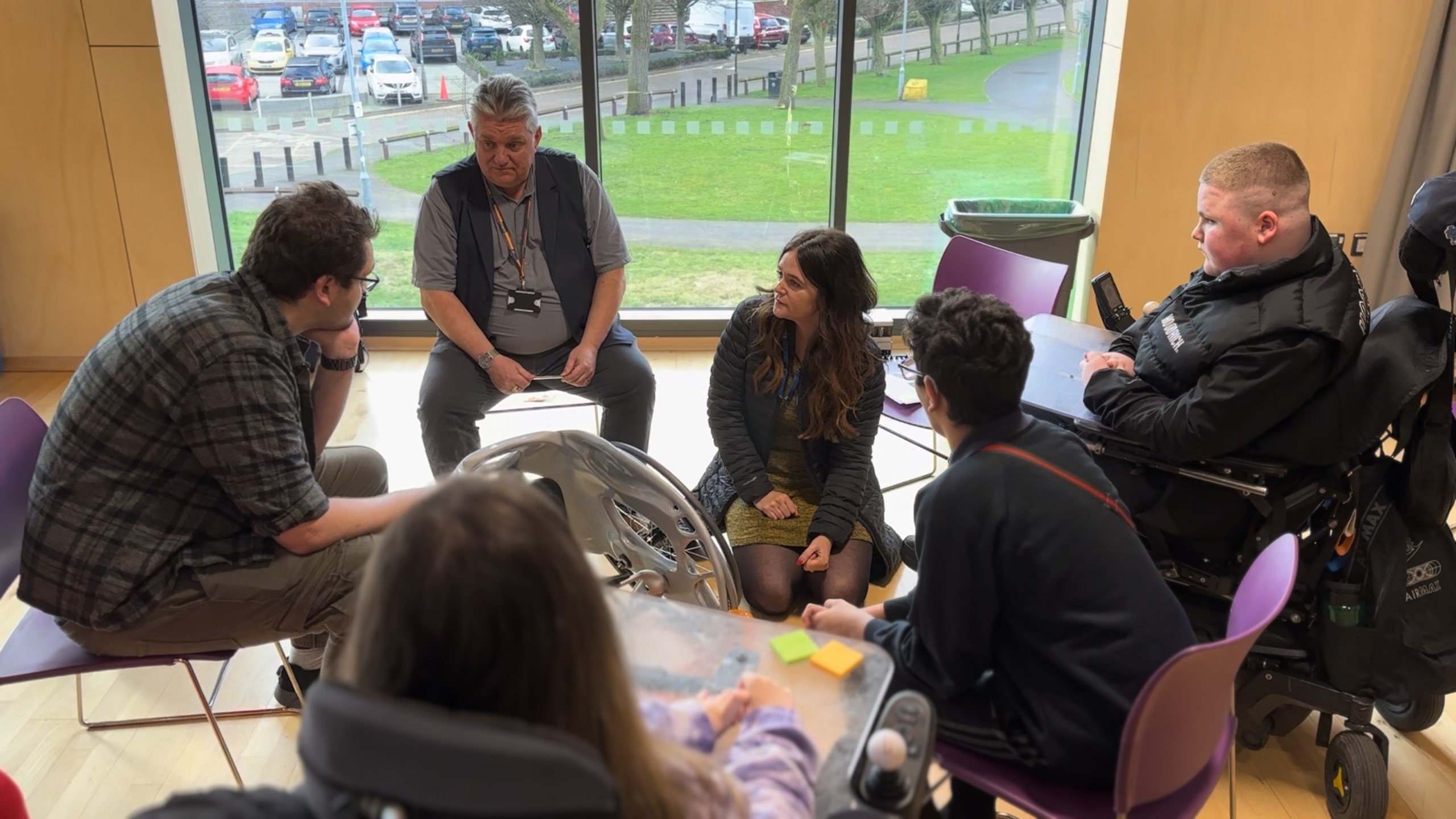
Chloe Lawson, Director of Learning & Inclusion at BOM, said: “We’re absolutely thrilled that Millennium Point is supporting us. We’re working with top-notch engineering organisations and helping them realise that the relationship between them and young beta testers is really important for the future of inclusive technologies.”
Abbie Vlahakis, CEO of Millennium Point, expressed her enthusiasm for the project: “We are incredibly proud to support Engineering Inclusive Futures. By providing these young minds with the opportunity to interact with cutting-edge technology at some of the world’s most innovative organisations, we’re not just educating them – we’re empowering them to become the problem-solvers of tomorrow.”
Engineering Inclusive Futures represents a huge leap towards realising a future where every child has the opportunity to explore, learn, and thrive in the STEM fields.
STEM grant funding is a great way to encourage children to get into the STEM industry. Funding can help schools or businesses provide opportunities and remove barriers in the way of children exploring STEM activities or a career within a STEM-related subject like science, technology, engineering and maths.
In this blog we’ll delve into the various benefits of STEM grant funding and how it can shape children’s futures.
What is STEM grant funding?
STEM grant funding is where organisations, institutions, government agencies or foundations provide financial support for individuals, not-for-profit organisations or educational institutions, within Science, Technology, Engineering or Maths.
Grant funding aims to promote and advance STEM education, research, innovation and workforce development by providing funding, resources and opportunities that align with STEM-related goals.
The benefits of STEM grant funding
It helps provide equal opportunities for all children
STEM grant funding plays a crucial role in providing equal opportunities for all children. Funding often helps to support schools, children and businesses in underserved areas to help bridge the opportunity gap within the STEM industry.
Funding can also provide STEM materials, teacher training and extracurricular activities that encourage students to explore various opportunities within the STEM industry. This can play a huge part in creating a more diverse and inclusive society by levelling the playing field for all children, no matter their background.
It encourages innovation
STEM grants can act as a catalyst for innovation. By providing financial support to researchers, entrepreneurs and organisations it allows them to undertake groundbreaking projects. Grants can fuel innovation by enabling the exploration of new ideas and technology and allows individuals and teams to take risks, push boundaries and turn concepts into reality.
Ultimately STEM grant funding allows complex challenges to be tackled that reshape industries and society.
It helps to support STEM career development
Grant funding can go a long way toward supporting STEM career development by offering financial assistance that can be used to create scholarships, internships and educational opportunities. This can help to remove financial barriers that prevent students from pursuing a career in STEM.
STEM grants often promote mentorship and networking, helping students interact with like-minded people. Mentors can also help guide them through their journey in the STEM industry, helping to create a stronger, more diverse and talented workforce.
It helps to strengthen the workforce
Grant funding helps to strengthen the workforce by supporting educational initiatives, training programmes and skill development activities that equip individuals for the skills needed to work in the STEM industry. As a result, the workforce is more adept at dealing with challenges and driving innovation. This helps to strengthen the workforce as a variety of industries will gain access to highly skilled and adaptable talent.
Encourages collaboration
The financial incentives of STEM grant funding encourage various stakeholders in the STEM industry to work together. For example, partnerships between educational institutions, research organisations, businesses and not-for-profit organisations can be formed to tackle complex issues and challenges.
This can help to spread awareness of the STEM industry, encourage more people to undertake an education and career in the industry and improve society by solving various problems with the latest technology. Ultimately, encouraging collaboration within the STEM industry can have huge positive effects on both the industry and the planet as a whole.
STEM grant funding at Millennium Point
The Millennium Point Charitable Trust provides funding to not-for-profit organisations, schools and colleges across the West Midlands Combined Authority yearly. The grant provides up to £20,000 to applicants for their STEM related project, subject to meeting eligibility requirements. We also welcome smaller grant applications of £1,000.
We accept applications from:
- Schools.
- Voluntary or community organisations.
- Registered charities.
- A constituted group or club Not-for-profit company or community interest company.
- Community Interest Company/Social enterprise.
- Statutory body (including town, parish and community council)
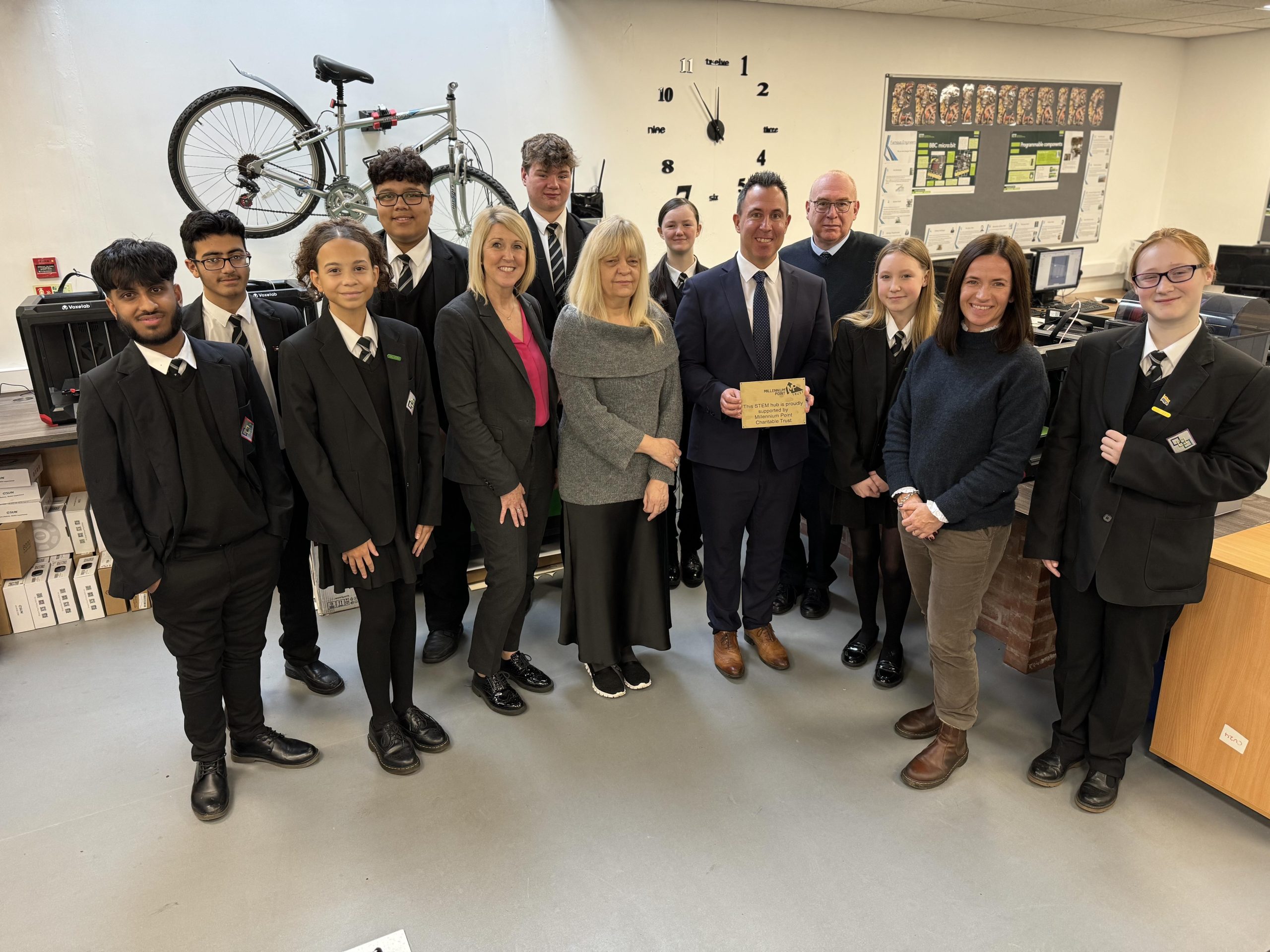
We don’t accept applications from:
- Universities.
- Hospitals or hospices.
- Individual Companies or sole traders that are aimed at generating profits primarily for private distribution.
- Organisations based outside the UK; we only accept applications from the geographical area covered by the West Midlands Combined Authority.
- Applications made by one organisation on behalf of another.
- More than one application per organisation.
STEM scholarship
We have partnered with Birmingham City University to provide a fully funded undergraduate degree at their Faculty of Computing, Engineering and Built Environment.
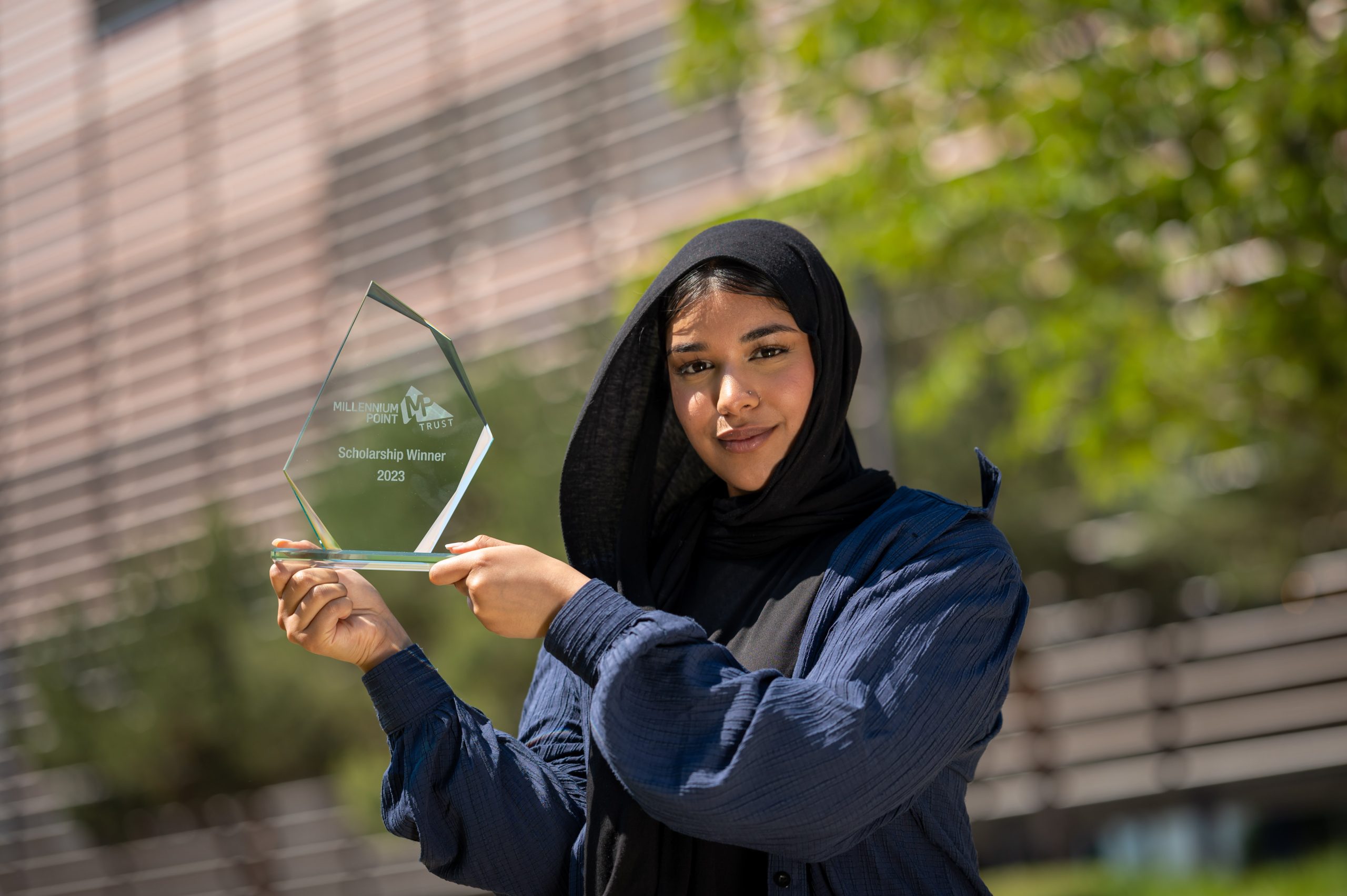
To apply for our scholarship you’ll need to meet the following criteria:
- You live in the West Midlands Combined Authority area in the United Kingdom. We don’t accept international applications.
- You are looking to start an undergraduate degree in the Faculty of Computing, Engineering and the Built Environment.
- Your chosen course is listed on our website under the ‘What Courses are Included’ section.
Dudley College of Technology has revealed its brand new STEAM (Science, Technology, Engineering, Arts, and Mathematics) hub, that will enhance education and accessibility within the community. The project, funded by Millennium Point has transformed an existing space which the college had outgrown into a dynamic space fostering innovation and creativity in students.
Nestled beneath Dudley Castle, the renovation of the current Design & Technology room, formerly an elephant house, is a result of collaboration between dedicated staff and students, and the financial aid provided by Millennium Point Charitable Trust. Approximately £17,500 of the total grant has funded the purchase of a wide array of cutting-edge equipment, including a 3D scanner compatible with 3D printers, height-adjustable workbenches, a laser cutter, and an F24 Greenpower kit-car. This array of tools is designed to cater to learners of all abilities and empower an inclusive educational environment.
Part of the Millennium Point funding will also enhance the STEM library, making it a valuable resource for local Dudley Academies Trust (DAT) schools and the broader community. This vision extends to Brierley Hill’s Inspired Art and Design Centre, which is under consideration as a dual site for the STEAM Hub, offering specialised support for students with SEN.
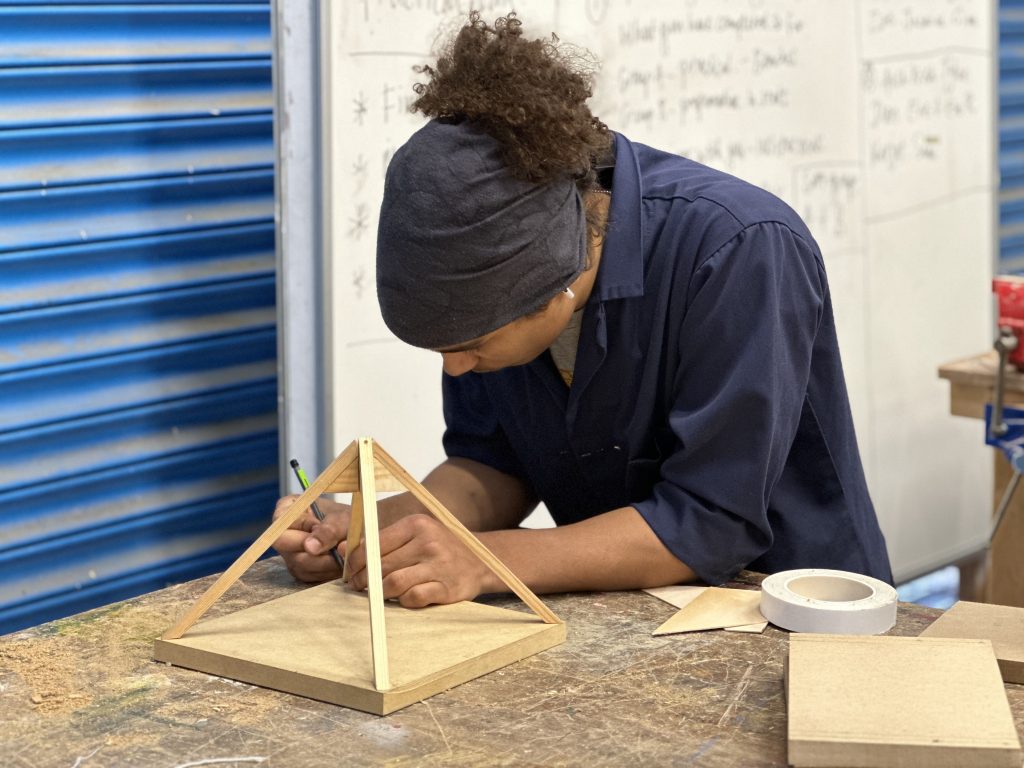
The iZone, Dudley College’s upcoming purpose-built engineering block, is another integral part of this project. Boasting a laser cutter and an existing printer, the iZone epitomises the high-tech aspirations of the STEAM hub initiative.
Adrian Eynon, Product Design lecturer at Dudley College of Technology, said: “Product Design is very much a traditional craft-based subject, but we’re wanting to modernise and move into a technological future with laser cutters and 3D printing, which will prepare students for the world they’ll experience in the industry. The investment will massively increase the quality and standard of the students’ work, and that quality will translate to their confidence.”
Abbie Vlahakis, CEO of Millennium Point, added: “I am immensely proud of our collaboration with Dudley College of Technology and establishing the Universal Access STEAM Hub. This project underlines our mission to promote STEAM education, and we hope it will serve as a cornerstone for educational excellence, and inspiration for the local community.”
Set to welcome its first students in early 2024, the Universal Access STEAM Hub marks a significant milestone in the college’s history. This transformative educational environment is set to inspire not only the current crop of learners, but also future generations.
Trinity High School & Sixth Form Centre in Redditch has marked the grand opening of its brand new STEM room, a cutting-edge facility that is revolutionising the way students engage with science, technology, engineering, and mathematics (STEM) subjects. The project, funded by Millennium Point’s STEM grants programme, has transformed a once-neglected space into a vibrant hub for innovation, creativity, and hands-on learning.
The STEM room, located at the heart of the school’s Creative and Technical Faculty, is the result of a collaborative effort between dedicated staff members, enthusiastic students, and the invaluable financial assistance provided by the Millennium Point Charitable Trust. The project saw the conversion of a previously unused and unloved space, into a state-of-the-art facility designed to inspire and empower future engineers, designers, and scientists.
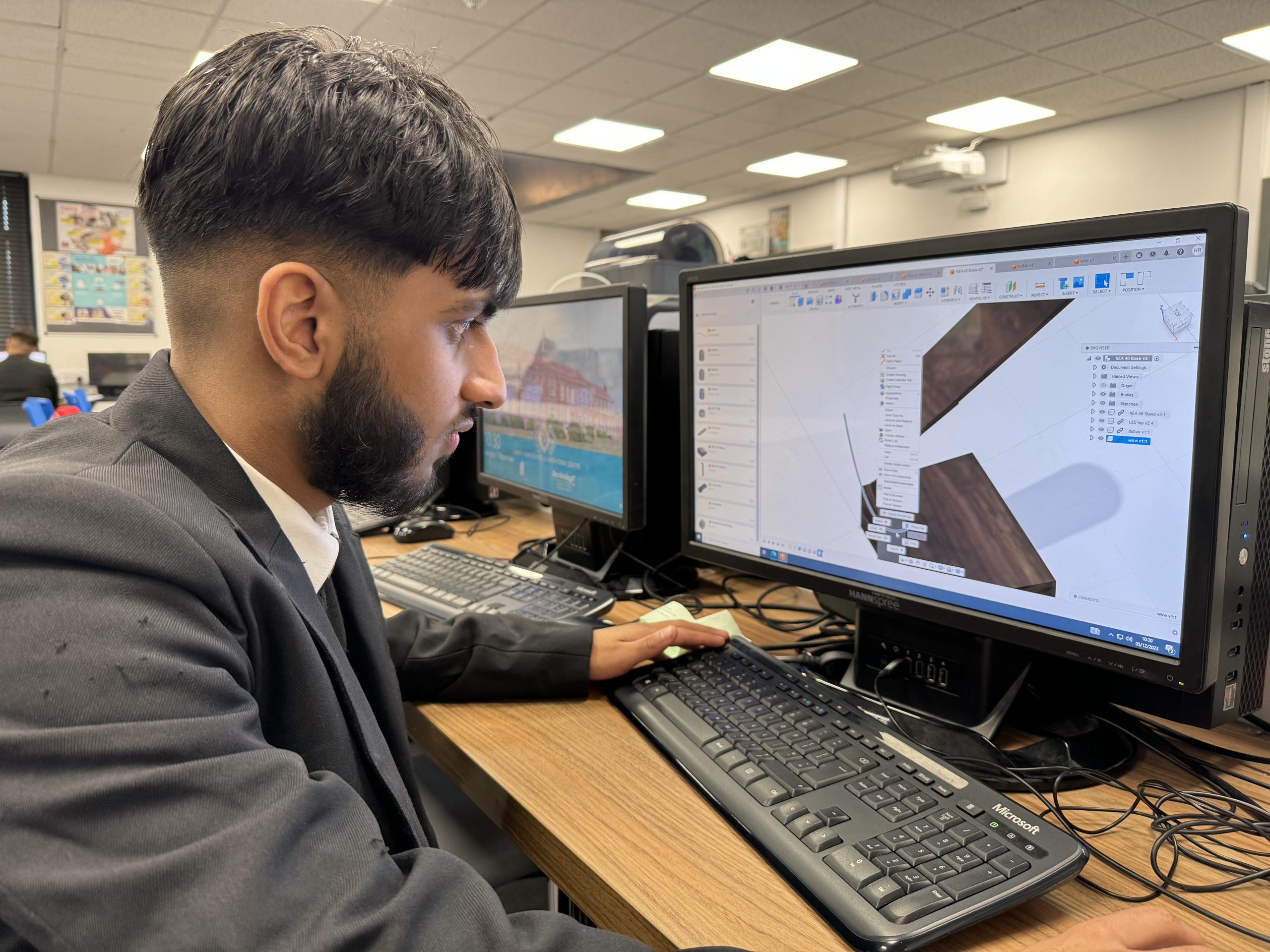
The new space serves as a classroom, computer suite, and rapid prototyping room equipped with a laser cutter and 3D printers. Students have access to industry-standard software like Fusion 360, allowing them to design, create, and witness their ideas come to life. The room accommodates up to 25 students and is currently being used for GCSE Engineering classes, computer science lessons, and after-school STEM club activities. The room has also welcomed visits from middle school students as part of their transition programmes and supports art classes and 3D jewellery design.
Nigel Ford, Headteacher of Trinity High School & Sixth Form Centre, said: “We are immensely grateful to Millennium Point for its invaluable contribution, which has not only enhanced the educational experience but also revitalised a neglected space to breathe life into our STEM subjects. By introducing real-world technology to our students, they can now develop their design ideas and witness them materialise before their eyes. It’s truly astonishing to see their enthusiasm and pride in their accomplishments.”

Abbie Vlahakis, CEO of Millennium Point, said: “We are delighted to have played a role in transforming Trinity High School & Sixth Form Centre’s STEM room into a vibrant and innovative space for learning. This initiative perfectly aligns with our mission to promote STEM education and empower the next generation of innovators. Trinity High School’s dedication to this project has been commendable, and we are delighted to have played a part in making this vision a reality.”
A special plaque unveiling ceremony took place on December 5th, 2023, to formally open the new STEM space. The ceremony was attended by school staff, students and representatives from Millennium Point.
Read more about Millennium Point Trust Grants here.
Applications for our charitable Trust STEM Grants programme are now open!
Our grants are available from £1,000 to £20,000 to individual applicants to support science, technology, engineering & maths (STEM) education in Birmingham and the wider region. Applications close at 5pm on Friday 8th December 2023, meaning you have got just under a month to apply. You can apply here.

We want everyone to have the best chance of success. That’s why we have put some useful tips below.
A good plan is half the work done
To get started, complete the form that can be easily downloaded from our website. Have a read through all the sections and start to complete them in as much detail as you can as this will help us when our team begin to shortlist applications.
Clearly plan what the aims of the project and how those aims will be achieved. Don’t forget to include details on how the success of the project will be measured. This is where using ‘SMART’ objectives will be useful.
- Be specific
- How can it be measured?
- Is your goal attainable?
- Is your project relevant?
- Can you achieve your project in the timeframe?

Make sure your application is detailed with what activities will take place, when, and where they will be carries out will also help chances of being successful. Have a look through your budget plan and ensure it contained the correct pricing and quantities for everything you need to achieve your project.
When talking about your project look at the link between the project and the selected category choice. Make sure the connection is clear to show why you’re doing the project and how it will benefit your chosen group. Also plan about the duration of the project, will it be throughout the year, or could the project be done in a day? Can the project be repeated with the resources bought, or is it a one-off project?
For extra help the guidance and FAQ pages will help you with your application, you can always contact our friendly Trust team too [email protected].
Submitting your application or grants
Have a read through your final application, ensure that it’s clear, precise and explains all about the exciting project you have planned.
After you have decided you’re happy with your application, submit it to us by email – [email protected]. Make sure you send it in before the 5pm on 8th December 2023.
What happens next?
Once it’s sent over, out fantastic Trust team will send you an email acknowledging receipt, you won’t hear from us again until a decision has been made. All applications will be read through by the Grants team and then moderated by a separate panel. It will finally be presented to our Trustees who will make the final decision on the successful applicants. At this stage you don’t have to do anything but wait for the good news!
Our grants help make STEM happen!
Over the past five years, the Millennium Point Charitable Trust has awarded over £2 million to charities, not-for-profits, community groups and schools to further STEM education. Millennium Point Charitable Trust has previously seen the rewarding outcome of past projects such as designing the perfect community at Lyng Primary School and Sandwell College going 3D.
Last year Millennium Point Trust saw 100 applications from not-for-profit organisations in aim of receiving a share of the grant money.
At Millennium Point, giving back to the community is massively important to us, which is why we have our Millennium Point Charitable Trust where we invest funding to help further STEM education in the West Midlands.
This blog will explore how we’ve helped people and schools around the West Midlands gain better STEM opportunities.
Millennium Point’s charitable mission
Our mission is to advance education for public benefit. We have a special emphasis on, but not limited to, the industrial and technological processes that have not only shaped the modern world but will also play a pivotal role in shaping the future.
Flagship initiatives
We have three exciting flagship initiatives built for improving educational opportunities. These include:
Grant funding
This provides funding for not-for-profit organisations, schools and colleges across the West Midlands Combined Authority area. Applicants can apply for up to £20,000 to fund a STEM-related project, as long as it meets eligibility requirements. Their idea will also need to showcase the measurable impact it will have on STEM education and/or a STEM career choice.

We have awarded over £2,100,706 to charities, not-for-profit (NFPO’s) organisations, community groups and schools over the last 5 years.
To learn more about how our grant funding works, take a look at our page.
The scholarship programme
We’ve partnered with Birmingham City University to provide a fully funded undergraduate degree at their Faculty of Computing, Engineering and The Built Environment.
Applications are currently closed for 2023, but you can keep an eye out for next year’s applications opening here.
The STEM Roundtable
The STEM Roundtable brings together leaders from STEM industries, primary and secondary schools, further education, higher education and NFPO’s in STEM sectors.
The Roundtable aims to:
- Provide a platform for support and communication, helping to share ideas and collaborate on STEM projects
- Shape the future of STEM learning
- Reverse current negative trends in STEM
- Increase home-grown STEM talent
Key objectives
We have a few key objectives we’re aiming to meet, as we support others in their STEM journey. These goals include:
- Addressing the STEM skills gap through education and re-education of STEM skills
- Encouraging traditionally marginalised groups (girls, women, BAME and LGBTQ+) to go after roles in STEM
- Provide support for the growth of STEM skills and careers within education
- Help support the growth of activities and events that promote STEM skills and careers
- Raise the profile of STEM skills and careers
Case studies
Over the years we’ve supported many schools and organisations in the West Midlands, as well as those looking to pursue a career in STEM. So here are a few examples of people and organisations we’ve helped.
St Edmund’s Campion RC School
We’ve worked with St Edmund’s Campion RC School to create a STEM club that provides chances for children to explore topics that aren’t in the curriculum and work on large-scale projects.
This has been introduced, due to the school having a high level of disadvantaged students and many of them feeling as though an academic future and/or STEM career is out of their reach.
The school received the grant as it was important that their afterschool program delivered excellent quality lessons and gave children the opportunity to learn about STEM subjects just like other children do.
You can learn more about how we helped the school on our website.
Aston Villa Foundation – STEM Stars
The Aston Villa Foundation’s mission is to work together to enrich lives, which is why they deliver Aston Villa Football Club’s community and social responsibility work.

STEM Stars developed a new STEM programme for six schools within a three-mile radius of Villa Park. The grant funding will purchase a Sphero robot package (this includes robots and a small pitch) which will use football to get children engaged in coding.
Due to the area around Villa Park being highly deprived in terms of income and education, it was important that the grant went to something helping to give children better opportunities within the STEM industry, in this case focusing on coding.
You can learn more about STEM Stars here.
Safa Bibi secures scholarship glory
Last year our winner, Safa Bibi, used the scholarship to undertake a degree in computer science at Birmingham City University.
Safa is the ninth winner of the scholarship, meaning we’ve already funded eight fantastic winners in their STEM career.

If you’re interested in learning more about how the scholarship works and how you can apply, take a look at our scholarship page.
We’ve been giving back to the community for the past 20 years and would love for you to get involved. If you’re interested, get in touch with us today!
Background
Lyng Primary School’s vision is to provide a nurturing, happy, and safe environment. Surrounded by caring adults, pupils are provided with opportunities to become the best they can be. The school strive to ensure that every pupil leaves feeling confident, self-motivated, and independent so that they are ready for the next stage in their lives.

Aim of the project
Lyng Primary School’s aim was to engage all pupils in STEM by encouraging them to become ‘Lyng Architects’. They were given a design brief asking them to design and build their perfect Lyng community. The brief included a strong enthesis on being eco-friendly, promoting rewilding, and sustainability. The pupils responded with innovative designs for the community.
The designs and creations were achieved by using CAD software. The work was then 3D-printed to display in the school foyer alongside handmade examples. The project was also supported by parents who came in to help their children build their designs.

The Millennium Point Trust Grant provided the grant that allowed the school to purchase 3D printers, laptops and resources to make the project happen.
What impact has it made?
Over 500 students benefited from the Millennium Point Trust Grant. It has provided staff with amazing opportunities to plan and deliver an exciting STEM project for their class. Over 95% of students never have had the opportunity to use 3D printers or CAD software before. The grant allowed them to learn about career options that may not have been accessible to them prior.
Parents who got involved in the project had high praises for the project, one parent said ‘kids get more fun by seeing their parents working with them inside school, sitting with them together’. Another said ‘it was nice to be invited into school and involved with my child’s afternoon, I thoroughly enjoyed it! Thank you.’

Governors were also invited to the ‘Inspire’ afternoons, one comment received mentioned ‘I really enjoyed the afternoon, it’s always great to come in and get involved with what they are working on. I thought the project was brilliant and the children had so many great ideas, I think there might be some budding engineers amongst them and clearly some pupils are cut out to be supervisors! It was great to see them all working together and making their ideas come to life. Really great event, would love to see more of these.’
Get involved with Millennium Point Trust
Our multi-award-winning charitable trust invests more than £3m each year towards furthering STEM education within the West Midlands.
Over the years we have provided funding to Scholarships, Grants, and projects that benefit the region. Find out more about our Trust and see how you can get involved here.
Background
Sandwell College is the largest provider of 16-19 year old study programmes in the West Midlands. Their mission is to ensure that every young person has the opportunity to reach their full potential, achieving a successful career in their chosen field.
Aim of the project

The aim of the project was to set up a 3D Immersive Learning Lab, introducing exciting, engaging and innovative STEM-related learning projects across the colleges curriculum, using emerging technologies such as virtual reality programming.
A series of workshops will be run to inspire students to become more engaged in STEM, promoting careers through virtual reality workplace tours, connecting with those who previously might not of seen STEM careers.
What impact has it made?
The project has begun with great success, giving students a fantastic insight into 3D modelling and virtual reality activities around STEM.
The college has partnered with Cadbury College in Kings Norton to use some of their facilities to host the equipment for students.
Through the use of iPads and VR, the students have taken part in a number of exciting activities to enhance their STEM learning. These include entering new worlds and visualising scientific concepts and diagrams, such as life-sized DNA structures.

They have also tested out Augmented Reality Cubes, which combined with a VR headset allows the students to hold the cube and they visualise holographic 3D models (such as engines, the human brain and CAD drawings) in the palm of their hands. As they rotate these around they can view them from all angles.
Moving forward the college are looking to attract more students to study STEM courses, using the equipment to engage them in a fun and effective way.
Get involved with Millennium Point Trust

Our multi-award-winning charitable trust invests more than £3m each year towards furthering STEM education within the West Midlands.
Over the years we have provided funding to Scholarships, Grants, and projects that benefit the region. Find out more about our Trust and see how you can get involved here.
Building on the success of last year’s SciSPORT event, which saw 1,000 visitors visit Millennium Point. We are excited to announce our next event in our SciSERIES, SciMED!
Last year we welcomed students from 28 schools across the region to participate in a range of thrilling activities, workshops, and talks delivered by organisations and personalities from the world of science and sport.
To get an idea what’s in store, watch below how the SciSPORT went –
This event is open to upper primary (years 5 & 6) and lower secondary (years 7 & 8) school students. To confirm your place, email our friendly Trust team [email protected].
SciMED – showcasing the importance of STEM in the medical industry
The SciMED event that takes place Monday 10th July, seeks to inspire the next generation of STEM students with all things ‘medical’ – from the traditional careers such as doctors, veterinary, and dentistry, through to wider STEM related sectors such as psychology, health, wellbeing, and pharmaceuticals, whilst showcasing technology and engineering advances in all associated sectors.
Students will be able to explore:
– Interactive workshops
– Sports and fitness
– Medical activities
The day also includes visits to the award winning ThinkTank Science Museum!
Sign up to book your school’s place today and discover all things STEM and Medical.

Get your company involved
There is still time to get involved with SciMED with your team. Promote your company and showcase your innovations to young people from schools across the region. With lots of exciting exhibitions already joining us, now is the time to book your place to ensure you get the chance to connect with the future of your industry.
This is just one of the ways we’re supporting STEM in the region
Our multi-award-winning charitable trust invests more than £3m each year towards furthering STEM education within the West Midlands.
Over the years we have provided funding to Scholarships, Grants and projects that benefit the region. Find out more about our Trust in our brochure here.